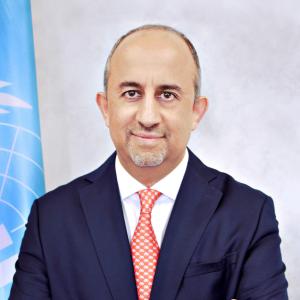Ladies and gentlemen, distinguished guests,
It is my pleasure to join you today in this discussion on private investment for delivering the Sustainable Development Goals – the SDGs. In 2015 UN member states came together to agree on “the 2030 Agenda with its Sustainable Development Goals”. An agenda of unprecedented ambition, where achieving these goals by 2030 needs all our collective will, ingenuity, commitment, and resources.
In less than seven years to reach 2030, progress towards the SDGs seems significantly off track. The COVID19 pandemic stalled and reversed development gains across the world. Before global recovery was complete the impact of the war in Ukraine generated food and fuel price shocks resulting in protracted increase in inflation rates. Alongside escalating climate degradation and increasing inequality are threatening development gains.
Globally an additional 4.2 trillion dollars are needed every year between now and 2030 to achieve the SDGs. There are not enough public resources globally to meet this funding gap. In addition to the need of Private investment at scale, the private sector can contribute in this process through entrepreneurship, risk taking, innovation and knowledge to implement the SDGs.
Today our discussion will focus on six critical transitions aiming at having a catalytic andmultiplier effect on all 17 SDGs.
The Six Transitions
1. Food Systems: Our food systems need to be more secure, socially inclusive and environmentally sustainable, through sustainable agriculture, waste reduction, and ensuringfood security for all. Private investment can drive innovations in Agri-tech, supply chain efficiency, and regenerative practices.
2. Energy Access and Affordability is pivotal to ending energy poverty and reducing emissions. We need to accelerate the transition to clean energy, improve access for underserved communities, and make it affordable to all.
3. Digital Connectivity: In our interconnected world, digital connectivity is essential, whereInvestments in broadband infrastructure, digital literacy programs, and e-governance can bridge the digital divide.
4. Quality education is a fundamental right and a driver of development. Private sector partnerships can enhance educational outcomes and prepare our youth for the futurechallenges.
5. Jobs and Social Protection: Decent work and social safety nets are crucial for ensuring that economic growth is inclusive and fair. Private investment can create jobs, promote fair wages, and strengthen social protection systems.
6. Climate Change, Biodiversity Loss, and Pollution: Our planet faces unprecedented environmental threats, where we need to transition towards a circular economy, protect biodiversity, and mitigate climate change. Private investors can support green technologies, conservation efforts, and pollution reduction.
The role of the private sector is critical in each of these areas because private capital is a powerful force for positive change – through innovation, responsible production, stewardship of natural resources, and taking to scale technological solutions.
That is why I am very happy to see this distinguished panel we have of development financiersand private sector actors, in addition to a diversified group of private sector representatives in the audience today. We will be listening closely to understand what the private sector can do to advance the SDGs, and how we can work together towards achieving achieve the SDGs where no one is left behind.
In September this year we will have the Summit of the Future convened by the UN Secretary General. It aims to be a key accelerator for the achievement of the 2030 Agenda and the SDGs. UN Member states will come together to agree on what we hope will be an ambitious outcome. Negotiations are under way on a Pact for the Future that can address the challenges of today and those of the future. Today’s discussion is among the many conversations that must inform the Summit of the Future and the progress towards the SDGs.
Thank you.



